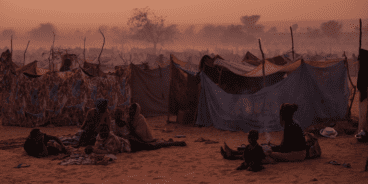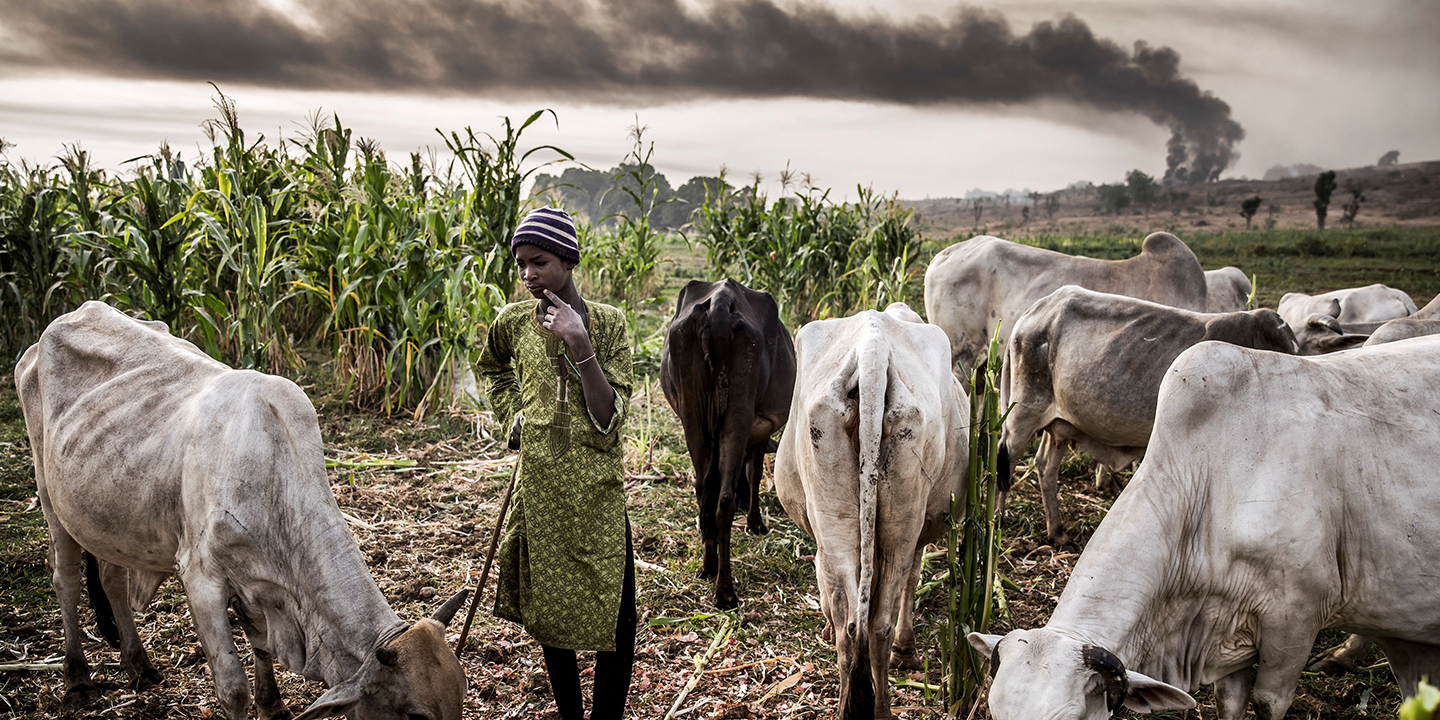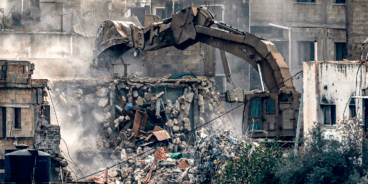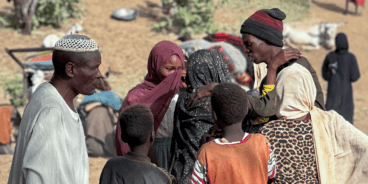

Atrocity Alert No. 342: Nigeria, Israel and the Occupied Palestinian Territory and Sudan
Atrocity Alert is a weekly publication by the Global Centre for the Responsibility to Protect highlighting situations where populations are at risk of, or are enduring, mass atrocity crimes.
LATEST SPIKE IN VIOLENCE BETWEEN HERDING AND FARMING COMMUNITIES IN NIGERIA
In less than a week, more than 70 people were killed in two separate attacks in Benue State, north-central Nigeria, where tensions between herding and farming communities have increased since March. On 7 April suspected herdsmen attacked a primary school housing internally displaced persons in Mgbam, killing at least 38 people, including 30 women. This deadly attack followed an earlier incident in Umogidi village, Entekpa-Adoka district on 5 April, when suspected herdsmen killed at least 46 villagers attending a funeral. In a statement on 8 April, President Muhammadu Buhari called for an end to the “extreme violence” and said that the attackers should “be found and dealt with” swiftly under the law.
While the cause for these attacks remains unclear, violent clashes between herders and farmers are common in Benue State and are often rooted in historical grievances between the communities. Since 2011 inter-communal violence, rooted in competition over scarce resources, has escalated in central and north-west Nigeria. Population growth and the expansion of farming areas, as well as growing desertification, have resulted in a loss of grazing land for pastoralists’ cattle. The clashes have become increasingly deadly as result of the proliferation of armed groups and gangs who engage in organized cattle rustling, kidnapping, plunder, murder and rape.
In addition to inter-communal violence, populations in Nigeria are at ongoing risk of atrocity crimes amid continued attacks by the armed extremist groups Boko Haram and the so-called Islamic State in West Africa (ISWA), as well as by armed bandit groups. Nigeria’s armed forces have been deployed in two-thirds of the states in the country and are overstretched as Boko Haram, ISWA and bandit groups expand their areas of operation. In addition, security forces are frequently delayed in their response to calls for protection by communities, leaving them vulnerable to attack.
President-elect Bola Tinubu – who will be sworn in on 29 May – will soon be responsible for tackling these multiple security challenges. During the election campaign in October 2022, Tinubu pledged that “we will deal decisively with all elements threatening our peace, security and unity. I guarantee you we will end kidnapping and banditry not only through increasing our policing capacity but also through another soft approach that would promote inclusion and boost the economy of our local communities.”
The Nigerian government must consider and implement sustainable non-military solutions to security threats throughout the country, including through adopting socio-economic initiatives and political reforms that tackle land rights and poor governance, as well as confronting corruption, poverty, youth unemployment and environmental degradation. The government should work with local civil society to ameliorate long-standing grievances between herding and settled communities.
PATTERN OF DEADLY RAIDS AND VIOLATIONS CONTINUES IN OCCUPIED EAST JERUSALEM
For the third year in a row, Israeli forces have carried out violent raids on the Haram Al-Sharif compound and Al-Aqsa Mosque during the Muslim holy month of Ramadan, using excessive and unjustified force. On 5-6 April Israeli forces violently entered the mosque, used stun grenades and tear gas, fired sponge-tipped bullets and indiscriminately beat Muslim worshippers, including elderly people and women. Over 30 Palestinians were injured and medical services were allegedly prevented from reaching and attending to those wounded. At least 450 Palestinians were also detained. Israeli police said they initiated the raid after “several law-breaking youths and masked agitators” reportedly brought fireworks, sticks and stones and barricaded themselves into the mosque.
The government of Jordan, which serves as the custodian of Al-Aqsa Mosque, denounced the raid “in the strongest terms” and warned “of the consequences of this dangerous escalation.” In previous years, Israeli forces carried out similar raids, injuring more than 170 Palestinians in 2022 and over 1,000 in 2021. Violence in the Occupied West Bank rapidly escalated following the 2021 raid, and subsequent indiscriminate rocket fire by Hamas and airstrikes by Israel killed and injured over 2,170 Palestinians in Gaza and killed at least 12 Israelis.
The latest raid adds to the daily violence used to maintain the illegal occupation of Palestinian territory. Notably, Israeli forces have deployed lethal force with alarming frequency in recent months, regardless of the level of threat. According to the UN Office for the Coordination of Humanitarian Affairs and the Office of the UN High Commissioner for Human Rights, 2022 was the deadliest year for Palestinians residing in the Occupied West Bank, including East Jerusalem, since 2005, with over 150 Palestinians, including 26 children, killed by Israeli security forces. This year has been characterized by similar levels of violence, including some of the deadliest raids against Palestinians, as well as attacks against Israelis.
On 26 February and 19 March senior officials from Jordan, Egypt, Israel, Palestine and the United States held meetings and collectively committed to steps to de-escalate the situation, pause unilateral measures and prevent further violence. Despite these commitments, recent actions by the Israeli government contravene UN Security Council resolutions and international law, including the decision in late March to advance over 7,200 new settlement housing units, as well as to repeal part of the 2005 Disengagement Law – legislation which had previously ordered Israeli settlers to evacuate parts of the Occupied West Bank – allowing Israeli settlers to return to four illegal settlements.
On 6 April the UN Special Rapporteur on the human rights situation in the Occupied Palestinian Territory, Francesca Albanese, emphasized, “It is imperative that all parties comply with international law, without exception. Failure to do so fuels and perpetuates the culture of injustice and impunity.” The international community must ensure accountability for ongoing violations of international law in the region, including those used to perpetuate the illegal occupation of Palestinian territory and the crime of apartheid.
INCREASING TENSIONS IN SUDAN FOLLOWING STALLED POLITICAL AGREEMENT
On 8 April UN High Commissioner for Human Rights Volker Türk expressed alarm at the increasingly tense situation in Sudan following the Sudanese authorities’ decision to postpone the signing of an agreement to launch a new political transition and form a civilian government. The postponement of the signing – originally scheduled for 1 April – was the result of a disagreement between the Sudanese army and the paramilitary Rapid Support Forces (RSF) over the timeline for the integration of the RSF into Sudan’s regular forces, and the terms of command and control of the integrated army. This disagreement has renewed uncertainty and increased fears of a confrontation between armed forces. Sudanese authorities have increased their military presence in Khartoum, and media have reported that the RSF have sent armored vehicles “in anticipation of any emergency.” High Commissioner Türk stressed that “all efforts must now go to get the political transition back on the right path.”
Yesterday, 11 April, marked four years since mass protests resulted in the overthrow of Sudan’s former military dictator, Omar al-Bashir. While Sudan has undergone significant political changes since 2019, its democratic transition has faltered. On 25 October 2021 the military, under the leadership of General Abdel Fattah al-Burhan, seized power and dissolved the transitional council. Since the coup, millions of protesters have demonstrated across the country and continue to demand the reinstatement of a genuine civilian-led government. While attempting to curb demonstrations, security forces have been accused of repeatedly using excessive and deadly force, as well as unlawfully detaining and forcibly disappearing protesters.
The political agreement aims to establish a new transitional civilian authority that would, among other things, limit the role of the military in politics. Both General Burhan and General Mohamed Hamdan Dagalo, or “Hemedti,” deputy head of the current ruling Council and commander of the RSF, have delayed the process in attempts to retain power and avoid being held accountable for crimes committed against the Sudanese people. Under Hemedti’s command the RSF has a long history of committing atrocity crimes during the decades-long conflict in the Darfur region and beyond and violently repressed public dissent during mass demonstrations against military rule in 2019.
The Sudanese authorities need to urgently take measures to de-escalate the situation and agree on outstanding issues concerning security sector reform to avoid further delays in signing the political agreement. Human rights, atrocity prevention and the protection of civilians, as well as justice and accountability for past atrocities, need to remain central to the political agreement.
Related Content


World Leaders Must Act to End Israel’s Unlawful Presence in the Occupied Palestinian Territory
